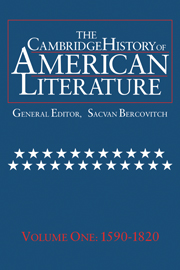Book contents
- Frontmatter
- Introduction
- THE LITERATURE OF COLONIZATION
- NEW ENGLAND PURITAN LITERATURE
- BRITISH-AMERICAN BELLES LETTRES
- THE AMERICAN ENLIGHTENMENT, 1750–1820
- THE LITERATURE OF THE REVOLUTIONARY AND EARLY NATIONAL PERIODS
- 1 Letters of the Early Republic
- 2 Magazines, Criticism, and Essays
- 3 The Drama
- 4 Poetry
- 5 The Novel
- 6 Charles Brockden Brown
- 7 Washington Irving
- 8 James Fenimore Cooper
- Chronology
- Bibliography
- Index
5 - The Novel
from THE LITERATURE OF THE REVOLUTIONARY AND EARLY NATIONAL PERIODS
Published online by Cambridge University Press: 28 March 2008
- Frontmatter
- Introduction
- THE LITERATURE OF COLONIZATION
- NEW ENGLAND PURITAN LITERATURE
- BRITISH-AMERICAN BELLES LETTRES
- THE AMERICAN ENLIGHTENMENT, 1750–1820
- THE LITERATURE OF THE REVOLUTIONARY AND EARLY NATIONAL PERIODS
- 1 Letters of the Early Republic
- 2 Magazines, Criticism, and Essays
- 3 The Drama
- 4 Poetry
- 5 The Novel
- 6 Charles Brockden Brown
- 7 Washington Irving
- 8 James Fenimore Cooper
- Chronology
- Bibliography
- Index
Summary
The association of the novel with individualism and the middle class has been an enduring staple of literary criticism. Ample historical evidence supports the linkage. In the United States, the novel developed in tandem with democratization and economic expansion, and although the form did not realize its potential until the Age of Jackson, a strong case can be made that it was complicit from its origin with the ethos of the marketplace. Early American fiction stood out as the most privatized and commercially viable of the literary arts, the genre most attuned to the social order of the future. “What is a novel without novelty?” asked the first indigenous novelist, William Hill Brown, in his posthumous Ira and Isabella (1807); his question highlights the insatiable appetite for the new that distinguished fiction from earlier forms of cultural expression. The postrevolutionary novel can be described as a prototypically “liberal” artifact. Anxious guardians of the status quo lambasted novels as popular reading material that pandered to mass tastes and subverted respect for traditional authority. Consumed in solitude, centered on personal ambitions and desires, and attracted, as the name indicates, to unfamiliar experiences, novels contributed to the undermining of a shared public sphere and encouraged the self-seeking outlook that flourished under Jacksonian democracy.
This picture, a familiar one, exaggerates the novel's collusion in the coming order; with the benefit of hindsight, it singles out the features that became dominant rather than those that receded over time. Scholars investigating the genesis of the English novel have begun to qualify the form's identification with the middle class and to see that its retention of conservative and “romance” elements placed it in a complex relation to triumphant individualism.
- Type
- Chapter
- Information
- The Cambridge History of American Literature , pp. 620 - 643Publisher: Cambridge University PressPrint publication year: 1994
- 1
- Cited by

